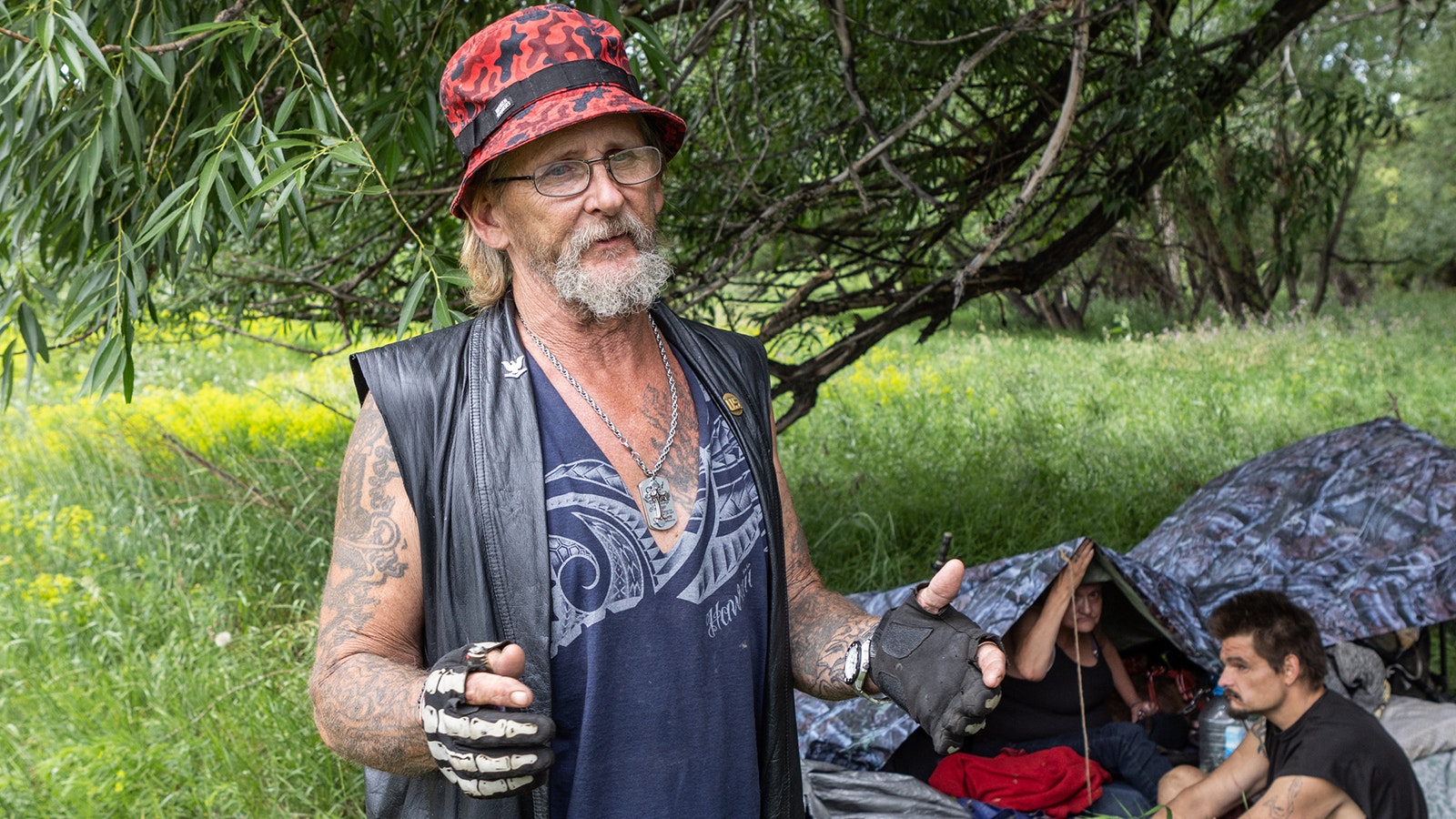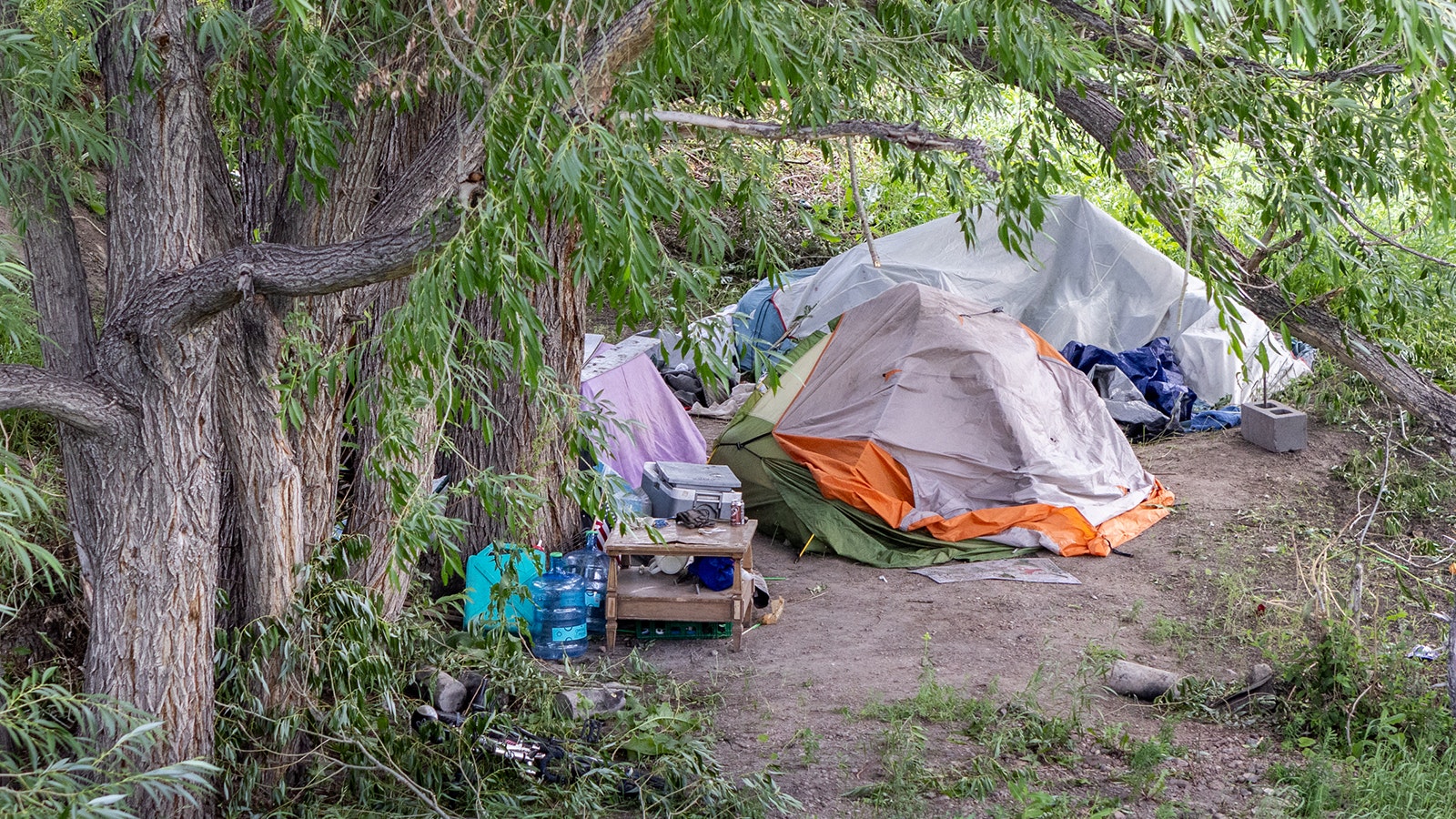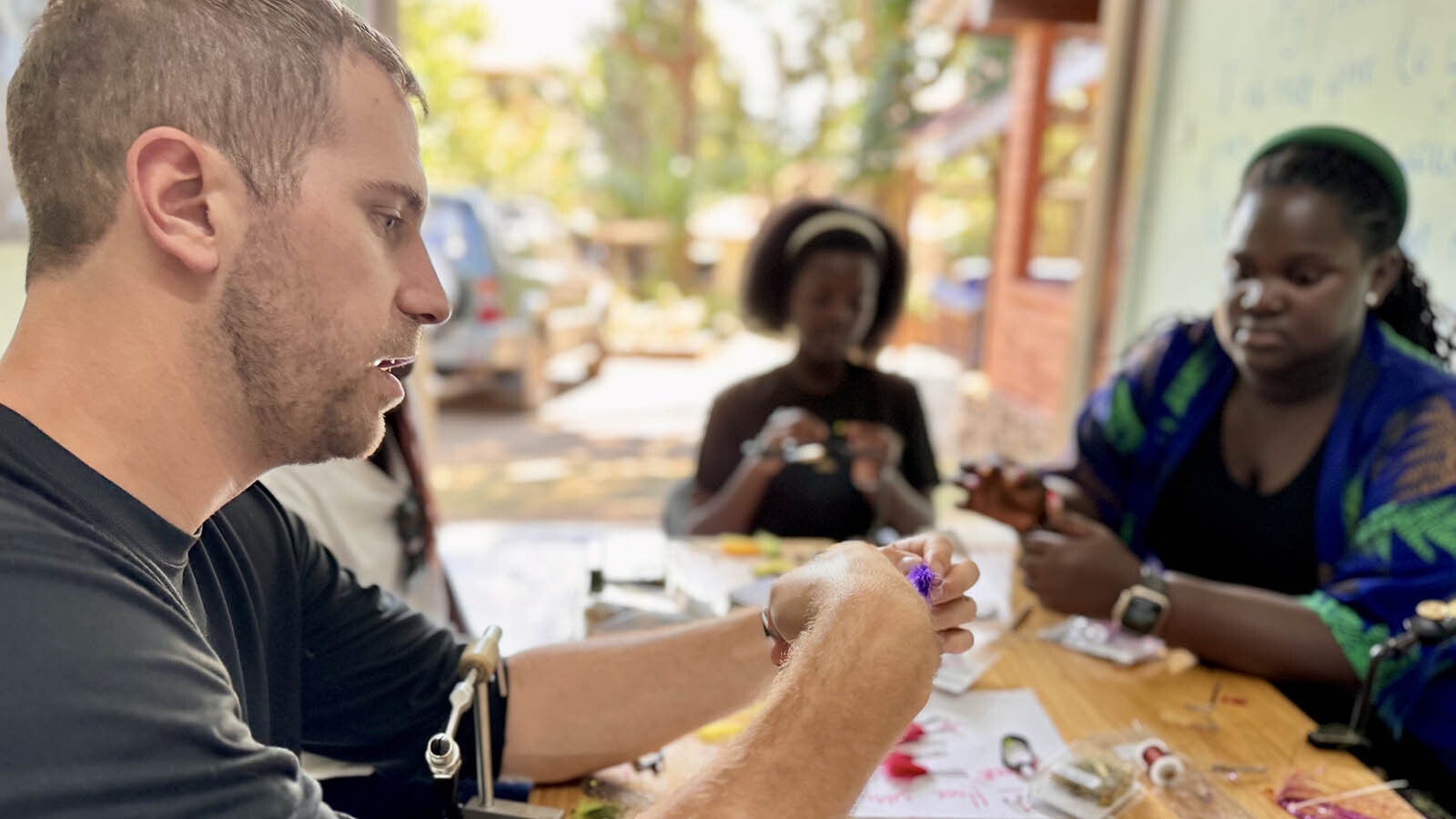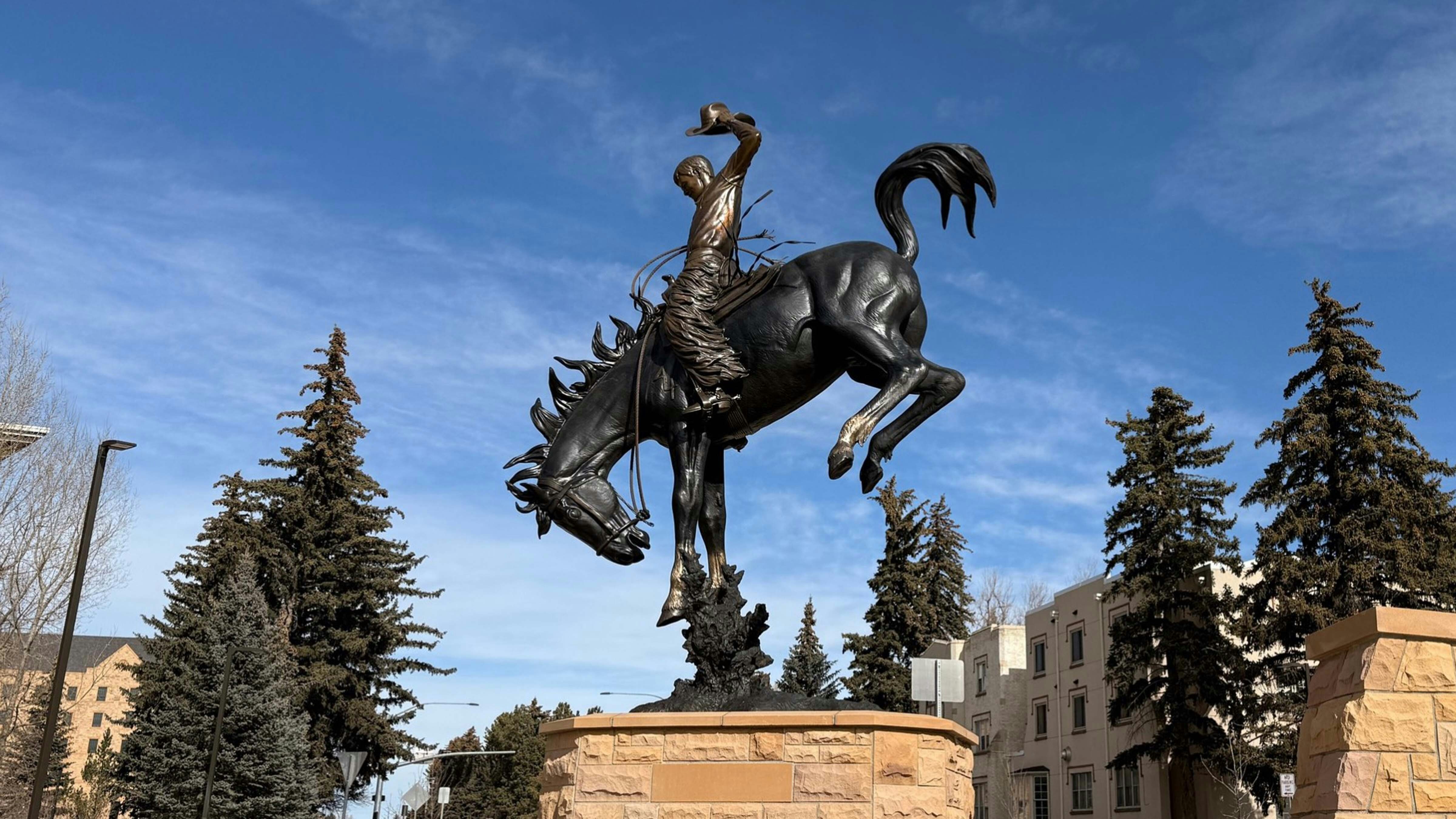When it comes to Cheyenne’s homeless community, few realize the true scope of their situation. They live in their own communities just outside the fringes of mainstream society, often beneath notice in the shadows and background.
When they are noticed, it’s often through a negative lens. But talking to some of the local homeless people living in Cheyenne is a lesson in never judging a book by its cover.
Few become homeless overnight. More often, these individuals gradually fall through the cracks of society for a variety of reasons that can include addiction, unemployment and personal loss.
Once the spiral of homelessness begins, it can be difficult to get back on one’s feet and get a roof over their heads. For those lacking a support network of friends and family, it can be particularly tough.
A man who identified himself as “Jay” to Cowboy State Daily is a Cheyenne native and spends his days under a bridge at Martin Luther King Jr. Park. He has been homeless for almost two years.
Jay struggles with depression and other mental health issues.
“I have been pushed out on the street,” Jay said. “There’s no place for me to go. I have to hide for shelter.”
Jay said most people become homeless as a result of an addiction of some kind. He’s had his own battles with this.
“I have turned myself to God and asked for forgiveness for all my sins,” he said.

The Shelter
Robin Bocanegra, is the executive director of the Cooperative Ministry for Emergency Assistance (COMEA) homeless shelter in Cheyenne. Bocanegra said the shelter often becomes an awkward home for people who have nowhere else to go. She doesn’t see the homeless situation in Cheyenne and Wyoming improving until a focus is put on providing resources to people to heal.
“We (society) don’t take care of our elderly, we don’t take care of our young people, we just don’t have the systems in place to help folks,” she said. “We still have that standard of pull yourself up by your bootstraps and get the work done and you’re not mentally ill, just get over it. It just isn’t that easy.”
But Bocanegra also stressed that she doesn’t find throwing money at the problem to be a solution. She believes a focus needs to take place on the issues that cause people to become homeless in the first place.
“You have to find out what brought them there and try to address those and help these people become healthy,” she said.
In order to gain entry to the COMEA homeless shelter in Cheyenne, one must pass a Breathalyzer test. The shelter serves a free meal to the homeless at 6 p.m. each night.
Although the shelter provides some respite from the elements for homeless people, residents of the facility are still required to vacate the premises during the day aside from extreme weather events in the winter.
Stories
Homeless man Robert Holcomb said the COVID-19 pandemic was the biggest reason behind him becoming homeless, although he has been bouncing in and out of homes for about five years.
Because of his poor physical condition and reduced business at his prior job, the 59-year old said his employer decided to reduce his hours as a licensed certified chef to part time.
Staring forlornly at Crow Creek with his grizzled face, Holcomb said he feels trapped in his current predicament. He said he’s been actively trying to find work but hasn’t been successful.
“They expect me to work 20-25 hours a week and pay my bills,” he said. “How can you work 20-25 hours a week when I’m used to making anywhere from $1,500 a week after taxes or better, down to nothing but one night, one night at the bar.”
Holcomb said he has struggled to find employment that will hire him on for a full time 40-hours a week role. It’s a frustrating situation after having worked in kitchens his whole life.
“They say because of my condition I’m a health risk,” he said.
Even when he picks up side jobs, Holcomb said the income these tend to generate isn’t enough to cobble enough money together to pay a first month's rent and a security deposit, which combined, can sometimes run thousands of dollars just for a one-room space.
Jay had been working, but gradually lost his home, had his identification stolen and eventually the car he was living out of, which was repossessed when he stoped being able to make the payments on it.
“So I found myself in a situation where I really couldn’t even work anymore,” he explained.
Dana Davis has been homeless for about a year. She and her mom Donna Snow are living in a tent together by Crow Creek.
She lost her home shortly after a friend of hers died in her arms upon being murdered.
Moving on from this event, Davis said, has been a struggle.
“We’ve been down here ever since then,” she said. “This is where I’ve done my therapy.”
Homeless man Ricky James was recently released from prison after spending the last two years and nine months in custody. Besides a few stints in jail, he has been homeless since 2009.
James said once someone is in custody for a significant amount of time they lose property and sense of stability that cannot be regained even if found not guilty down the road.
“If you don’t got nobody to pick up your stuff, there goes your ID, your laptops, any kind of identification that helps getting jobs,” he said.
Once someone is charged with a felony they lose their voting rights, right to bear arms, and many other opportunities that can hinder future employment.
James, 54, isn’t confident he will be able to attain employment because of his age.
“My back hurts, I can’t breathe, I don’t got 25-30 years in me,” he said.
Causes Of Concern
Davis said those who want to move them from their current encampment area are adding pain to an already stressful situation for homeless people.
But neighbors like Cathy Deister who live near Crow Creek said people permanently camping in this location is a legitimate cause for concern.
The Greater Cheyenne Greenway walking path, which passes along Crow Creek in South Cheyenne, is a somewhat densely forested area with thick brush and trees.
A fire started last Sunday originating from a homeless camp off Crow Creek, drawing fire responders to put out the blaze. Deister said due to the homeless encampments in this area and corresponding trash surrounding them, it was difficult for firefighters to reach the blaze.
“It’s a fire and safety concern for people who use the Greenway,” she said.
But Davis said she and others have done significant trash pick up in the creek area and fixed problems that other homeless people have created.
“Every time we went back in and fix it for good, do we get a thank you? No, we get cops called on us saying it’s us doing it (the damage),” she said.
Davis said she’s been told by Cheyenne Police in the past that as long as she and her mother keep their space in order and don’t commit crimes, they are free to stay. She said one officer told her that if she picks up three bags of trash a day the police wouldn’t bother her.
A Charged Issue
Homelessness has become a contentious issue in Cheyenne. The Cheyenne City Council is currently considering an ordinance that would effectively ban all “camping on public property” along Morrie Avenue and Crow Creek, specifically targeting a homeless population that has started to grow in this area. The ordinance would allow law enforcement to remove people living along the creek with advance notice. Those who don’t comply could eventually be taken to jail.
“There’s a lot of things the city could do instead of harassing people on the street while they’re sleeping,” James said.
James said it would be more useful if the city gave minimum wage work opportunities to homeless people so they could start getting back on their feet.
“From the temporary job they go into a part-time job that could lead to a full-time job,” he said.
Not A Homeless Saving Ground
Cheyenne can be a difficult place to be homeless. Unlike states that provide more benefits and support to homeless people like Colorado and California, Wyoming has little structure in place to assist homeless people. Wyoming also has a much colder climate than many other areas of the country.
Although Bocanegra acknowledged that many people in Wyoming are kind and giving, she said the state’s public systems are not set up to help homeless people adequately.
“There aren’t always a lot of resources for people, they’re very limited,” she said. “That’s why we have to rely on our community.
“The resources are not always there.”
COMEA is a non-profit and primarily relies on private donations to stay afloat.
Bocanegra said the homeless population in Cheyenne has grown in recent years, mostly as a result of people coming to the city from out-of-state. She said COMEA staff sometimes has to choose between serving Wyoming residents and those with legitimate Wyoming connections and those who do not. Often, her staff will encourage those who come from elsewhere to return to where they’ve come from so they can more easily attain housing and food stamps as a resident.
“Sometimes it’s better to stay in your own neighborhood,” she said.
Holcomb and Davis are both from other states.
Davis said she’s on the run from an ex, while Holcomb said he came to Cheyenne originally to work so he could earn money to help his sister who lived back in his home of Arizona.
“Couldn’t make the money to get back to her in Arizona,” he explained.
Jay grew up in Cheyenne and feels a connection to the area despite his difficult circumstances.
“I still know a lot of people … so that’s why I stay here,” he said.
James is from Cheyenne. He said places like California and Colorado are enabling people to continue being homeless due to the policies in those states.
“The amount of help that’s being given doesn’t change a person,” he said. “You could feed a person a fish every day and he’ll keep coming back to get fed. Teach him how to fish, he’ll get his own fish. There’s not enough job opportunities.”
Jay is employed. He washes dishes at a local bar and grill.
“I do realize, I shouldn’t be here,” he said softly.
Leo Wolfson can be reached at leo@cowboystatedaily.com.











